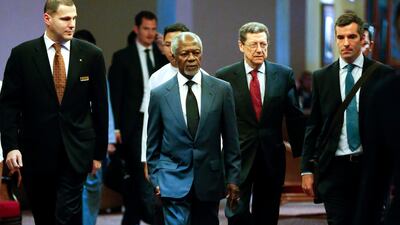Kofi Annan has warned the Myanmar government that violence in Rakhine state could escalate along with further radicalisation if authorities do not quickly implement the recommendations of the advisory commission he has led on the religious and ethnically divided region.
The former UN secretary-general also called on the government and international actors to ensure disagreements over the scale of human rights abuses against the Rohingya Muslim minority population in the region did not hold up moves to improve conditions.
“Unless concerted action — led by the government and aided by all sectors of the government and society — is taken soon, we risk the return of another cycle of violence and radicalisation,” Mr Annan said in the country's commercial capital Yangon on Thursday. The former UN secretary-general said he believed the recommendations do “stand a chance” of being implemented, but stressed it was the responsibility of the government do put them into action.
The final report of the year-long investigation by the Advisory Commission on Rakhine State recommended a number of significant changes likely to prove controversial within Myanmar.
It called for a revision of the 1982 citizenship law under which many of the country’s 1 million Rohingya Muslim population have been rendered stateless and which the commission said should be brought into line with international standards, and said the government should address the relationship between ethnicity and citizenship. That is a connection many in Myanmar hold sacrosanct, but which leaves hundreds of thousands of people in the country without basic rights.
The report, Towards a peaceful, fair and prosperous future for the people of Rakhine, also called for an end to the restriction of movement placed on Rohinyga by authorities who widely regard them as illegal immigrants from Bangladesh. The restrictions severely hamper access to health care, education and livelihoods.
Tensions have been high in the state since violence broke out between ethnic Rakhine Buddhists and Rohingya in the state capital Sittwe in 2012 leaving around 200 people dead and displacing more than 100,000.
The advisory commission was appointed by the country’s de facto head of government, state counsellor Aung San Suu Kyi in August last year. Its task was not to investigate human rights abuses, but come up with long term solutions to tensions in the impoverished state.
However just over one month after it was established, a deadly attack on border police posts in northern Rakhine prompted a brutal clampdown by the authorities against Rohingya communities with allegations of mass rape, murder, torture and large scale burnings of properties that provoked an international outcry.
According to the UN around 87,000 Rohingya have since fled to Bangladesh, but the Myanmar government, which has refused access to an official UN fact finding mission into the allegations, has consistently denied any large-scale abuses occurred.
Within Myanmar, reports on the abuses by international civil rights groups, foreign media and the UN were widely regarded as biased, exaggerated or deliberately falsified and treated with considerable suspicion.
Mr Annan said the border attacks and subsequent security response had made the commission's task more difficult but “increased determination” to find a solution. And he warned that current tensions between the authorities and international organisations should not get in the way of implementing the recommendations in Rakhine.
“There should not be a stand off [between the government and international agencies in Myanmar] … There is no time to lose,” he said.
The government has not yet released an official response to the findings. However Mr Annan said he had spoken to the government about the report and had received an assurance from Aung San Suu Kyi that some kind of ministerial mechanism would be put in place to oversee implementation of the report's recommendations.
He also said he had spoken to the head of the armed forces, Senior General Min Aung Hlaing about concerns for civilian safety amid a recent increase in troops stationed in the Rathedaung area of northern Rakhine State. Other key concerns are the restrictions in access to Rakhine for aid agencies and journalists.
Human rights organisations welcomedthe commission's recommendations. Phil Robertson, deputy Asia director for Human Rights Watch, said, “The Commission has developed an impressive set of common-sense, focused recommendations that if fully implemented could bring the sort of progress that has been missing in Rakhine State for decades. The ball is now in Suu Kyi’s court, and we’ll see if she can meet the high expectations created when she first asked Kofi Annan to lead this effort."
But Matthew Smith, chief executive officer of Fortify Rights accused the government of hiding behind the advisory commission instead of dealing with ongoing atrocities. His accusation is backed up by Zaw Htay, director-general of the president's office. In a recent interview, he admitted the government had used the commission as “a shield” when accused of human rights abuses.
“The Commission responded with concrete recommendations to end violations, and the government should act on them without delay," said Mr Smith. "The government needs to urgently address the realities on the ground.”

